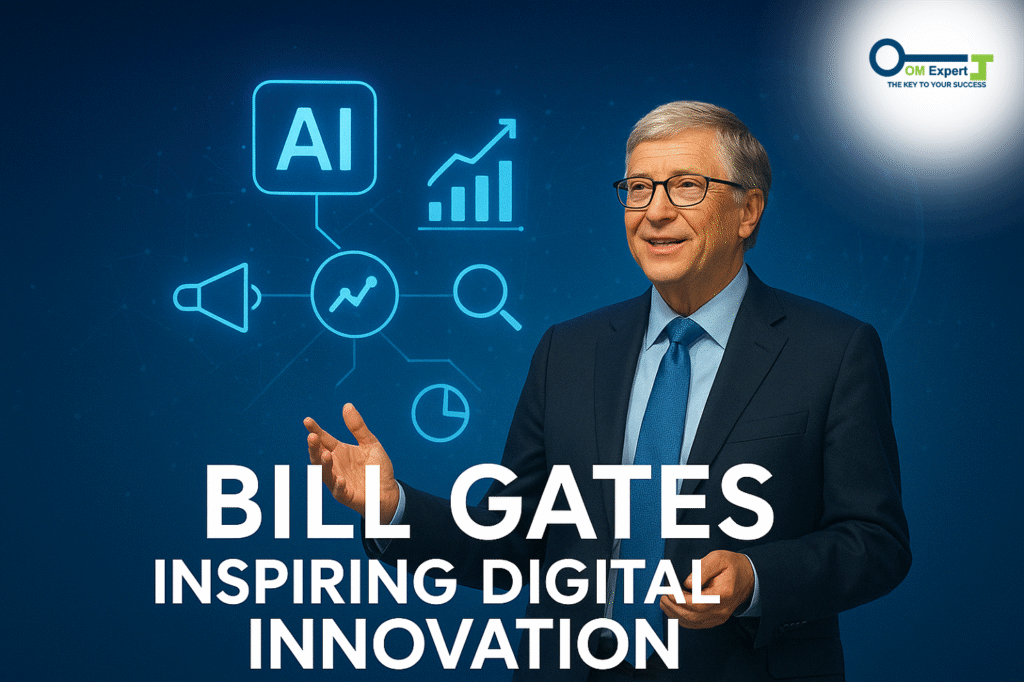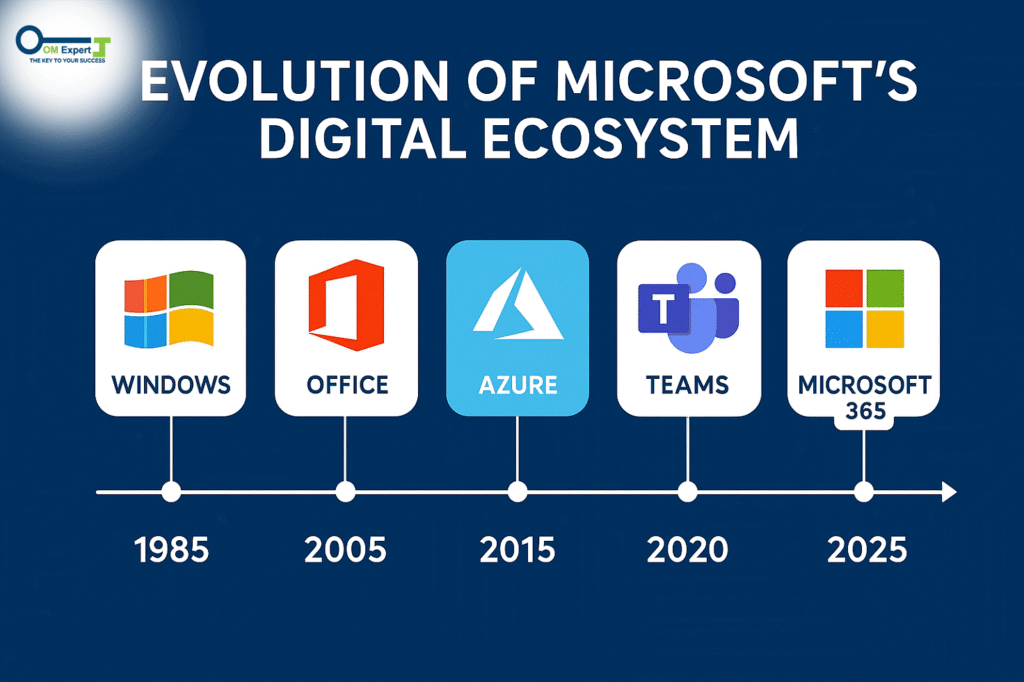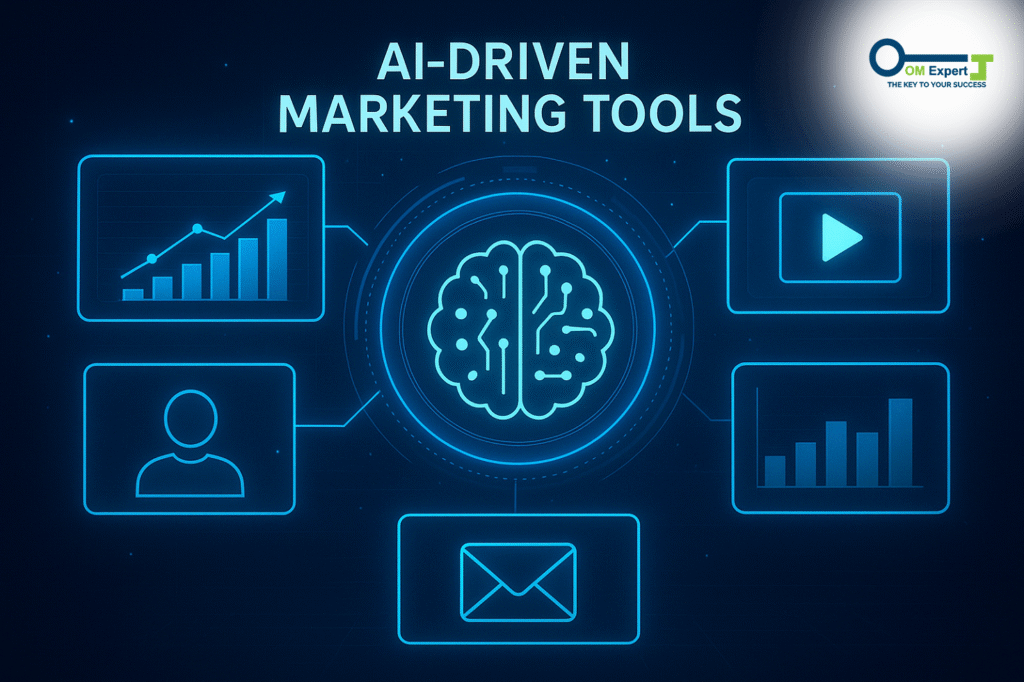Bill Gates’ Innovative Thinking and Its Impact on Marketing Strategies

Bill Gates is a great visionary in the rapidly changing fields of technology and business. The Microsoft co-founder is credited with encouraging a new generation of creative ideas in addition to revolutionising the technology sector. His views on innovation, leadership, and advancement have influenced how businesses currently plan and execute their marketing strategies.
As we move through 2025, digital marketers and entrepreneurs continue to draw lessons from Gates’ philosophy. In an era driven by AI in marketing, analytics, and customer data, his approach to problem-solving and adaptation demonstrates how brands can remain relevant and stay ahead of the curve. Gates believed that change should simplify life and create real value, and that belief has become the foundation for effective marketing strategies worldwide.
1. The Power of Innovation in Shaping Modern Marketing
Innovation has always been the driving force behind progress, and in marketing, it determines who leads and who follows. Bill Gates’s ability to see opportunity in change teaches us how creativity and technology can work hand in hand. His philosophy inspires marketers to think differently and act with purpose.
The Early Influence of Gates’ Vision
One fundamental idea guided Gates’s work at Microsoft from the beginning: innovation should make technology available to all. Digital marketing and the tech sector were both transformed by this idea. Gates made it possible for companies to communicate more effectively and develop marketing strategies that reached a wider audience by developing tools that made people’s jobs easier.
Innovation, adaptability, and a relentless pursuit of advancement were the defining characteristics of his company’s leadership approach. These ideas are essential in today’s marketing landscape, where success depends on intelligence and inventiveness. Marketers who embrace Gates’ philosophy are more adept at anticipating customer needs, reacting swiftly to market shifts and creating advertisements that appeal to both the intellect and the emotions.
Innovation as a Growth Engine
In addition to creating superior products, modern brands utilize tech innovation to enhance consumer experiences. Gates’ impact is evident in all facets of marketing strategies that prioritise long-term business growth, whether it is through automation, predictive analytics, or personalisation. His belief that “innovation distinguishes between a leader and a follower” remains true for marketers aiming to lead their industries.
2. Digital Transformation: The Legacy of Microsoft and Gates

Digital transformation is not only about using technology, but also about rethinking how we interact, communicate, and grow. Bill Gates’ vision of a digitally connected world laid the foundation for every modern marketing effort. His influence continues to shape how brands remain adaptable in today’s rapidly changing environment.
From Technology to Transformation
The rise of digital transformation owes much to Gates’ vision of a connected world. He foresaw the internet as a platform that would redefine communication and commerce, which ultimately revolutionised marketing strategies. Today’s businesses use data-driven marketing insights, automated workflows, and customer-centric approaches that all stem from this transformation.
Gates laid the foundation for contemporary digital strategy by making technology accessible and reasonably priced. Marketers can now design seamless online experiences, enhance campaigns using marketing analytics, and monitor audience behaviour in real-time. The values he promoted constitute the cornerstone of marketing change.
Empowerment Through Accessibility
Gates’ mission was always about empowerment. They are continuing the legacy of availability and value that he established when marketers use digital tools to build a brand revolution. This availability allows even small businesses to implement professional marketing strategies, harnessing AI, data and creativity to compete with larger companies.
3. Leadership Lessons for Modern Marketing Professionals
Leadership in marketing involves more than managing the entire company; it also entails building credibility and encouraging innovation. Bill Gates showed that great leaders focus on learning, adaptability and vision. His example continues to motivate marketers to lead with authenticity and interest.
The Human Side of Business Leadership
Gates’ leadership was defined by empathy and curiosity. The greatest leaders, in his opinion, are first and foremost learners. This requires marketers to remain up to date on audience preferences, algorithms and marketing trends. Gates’ example demonstrates that effective technology leadership is about empowering others to succeed rather than exercising control.
In the context of strategic marketing, this philosophy encourages brands to continually experiment, innovate, and refine their strategies. The most successful marketers are those who lead with purpose and who view failure as feedback rather than defeat.
Innovation Management and Adaptability
In a field that undergoes constant change, flexibility is crucial. Gates was a master at adapting to new technology as it emerged, and it is this flexibility that enables effective marketing strategies to flourish. Campaigns remain impactful and relevant when innovation is effectively managed. Marketers are reminded by Gates’ focus on learning and evolution that innovation is a continuous process rather than a one-time occurrence.
4. AI and Automation: Gates’ Predictions Come True

Gates foresaw this shift decades ago, and artificial intelligence is now the beating core of contemporary marketing. Smarter campaigns and more individualised consumer journeys are now powered by his insights into automation and data-driven innovation. The marketing world of today is the future he envisioned.
The Rise of AI in Marketing
Bill Gates hinted at the innovation impact of artificial intelligence on marketing when he said it would revolutionise human labour. Businesses can now analyse vast volumes of data and provide individualised client experiences thanks to AI in marketing. Marketers can create more accurate marketing strategies by utilising AI tools to forecast customer needs before they are expressed.
Marketing Optimisation Through Technology
The foundation of contemporary marketing is now automation. AI enhances marketing optimization by streamlining complex activities, such as scheduling social media updates and optimising ad placement. Gates’s conviction that technology can boost productivity is a natural fit for this development. His foresight continues to guide the integration of technology with creativity in marketing today.
5. From Content to Community: Gates’ “Content Is King” Philosophy
The phrase “Content is king” remains one of Bill Gates’ most powerful contributions to digital culture. It redefined how brands communicate and attract consumers. This section examines how that fundamental truth continues to influence storytelling in the digital age.
Content as a Core of Connection
Gates’ statement “Content is king” changed how marketers think about storytelling. He understood early on that valuable, authentic content builds trust and authority. In the world of social media strategy, this idea remains at the core of success.
Audiences today expect real engagement. Instead of using advertising messages, marketers who craft sympathetic stories build closer bonds with their target audience. The basis for influencer marketing, where genuine voices foster brand loyalty, was also established by this idea.
Understanding Consumer Behaviour
Marketers need to know what drives, inspires, and converts consumer behavior to provide content that engages them. Gates’ emphasis on client feedback and ongoing development serves as a timeless reminder that listening is more effective than speaking. Companies that adopt this mentality develop marketing strategies that appeal to a wide range of consumers.
6.The Global Impact of Bill Gates’ Innovative Ideas
Gates’ ideas transcended industries and borders, influencing not just business but also how humanity uses technology for the greater good. His approach to innovation teaches marketers that global impact begins with local understanding and purpose-driven communication.
Global Marketing and Purpose-Driven Brands
Gates’ generous work has influenced how brands approach global marketing. His focus on purpose and positive impact has shown companies that profit and purpose can coexist. Modern brands are now judged not just by their products but by their values.
Incorporating purpose into marketing strategies allows companies to connect emotionally with diverse audiences. Gates’ legacy inspires marketers to build campaigns that reflect empathy, inclusivity, and sustainability.
Business Strategy and Influence
Gates’ approach to business strategy highlights long-term value over short-term gains. This principle applies directly to marketing, where authenticity and consistency win over fleeting trends. His business influence demonstrates that when marketing aligns with genuine mission and vision, the results are lasting and impactful.
7.Tech Trends 2025: Continuing Gates’ Vision

Gates’ insight continues to be the compass pointing marketers in the direction of significant innovation as technology advances. His lifelong conviction that progress can be made with empathy and intelligence is reflected in the trends that will shape 2025. The next phase of marketing transformation is being driven by the principles he imparted decades ago.
Emerging Technologies in Marketing
The 2025 tech trends provide marketers with a whole new range of options. The way that consumers interact with brands is changing as a result of artificial intelligence, voice search, augmented reality, and predictive analytics. The fundamental idea, however, is still that technology must support human creativity.
Gates’ focus on practical innovation continues to guide these advancements. As marketers integrate new technologies, they must remember his belief that innovation without purpose is meaningless. True success comes from using tools to enhance empathy, storytelling, and connection.
The Future of Marketing
The future of marketing depends on finding a balance between reliability and automation. Gates’ concept encourages marketers to combine data with creativity, intention with ideals and innovation with humanity. This balance ensures that technology improves the client experience rather than reduces it.
8. Microsoft as a Case Study for Innovation Education
The development of Microsoft is a reflection of the effectiveness of storytelling and flexibility in marketing. The brand has endured across generations by being innovative and empathetic. The following insights reveal how Gates’ leadership turned Microsoft into a masterclass in brand strategy.
Microsoft’s Transformation
Microsoft changed from a software business to a symbol of empowerment under Gates’ direction. Marketing professionals may learn a lot from innovation case study. Microsoft exemplified how businesses can leverage values and purpose to fortify their identity by emphasising emotional appeal and storytelling.
Inspiration for Modern Campaigns
This similar approach is frequently used in successful modern marketing campaigns, combining empathy and technology. Gates’ impact continues to motivate innovative marketers to utilise innovation for good, whether it be in the areas of social responsibility, accessibility, or inclusiveness.
9. Timeless Lessons from Gates’ Innovative Mindset
Gates’ influence extends far beyond software or business. His ideas about curiosity, adaptability, and integrity define what effective marketing strategies look like today. In an era marked by tech disruption, his mindset helps marketers navigate complexity with confidence.
Gates’ ideas on learning and teamwork continue to be the model for success as tech entrepreneurs and tech pioneers continue to influence industries. His dedication to creative marketing and commercial business innovation demonstrates that genuine progress comes from finding solutions to pressing issues rather than merely making noise.
The fundamental reality that every marketer who studies his journey discovers is that innovation is meaningless without empathy. It’s this understanding that turns good marketing strategies into great ones.
Conclusion: Applying Gates’ Legacy to Your Own Growth
Bill Gates’ innovative thinking developed technology, changed industries, and altered how companies expand. His teachings on purpose, leadership and curiosity offer a timeless manual for creating more intelligent and enduring marketing strategies.
His goal continues to empower creators, marketers and businesses through digital transformation and brand innovation. Gates showed us that advancing others is the real goal of invention. Understanding people, motivating them, and establishing trust via action are all part of marketing.
Go to OM Expert if your company is prepared to clearly embrace innovation, creativity, and expansion. Find out how digital excellence and strategic thinking can elevate your brand.
